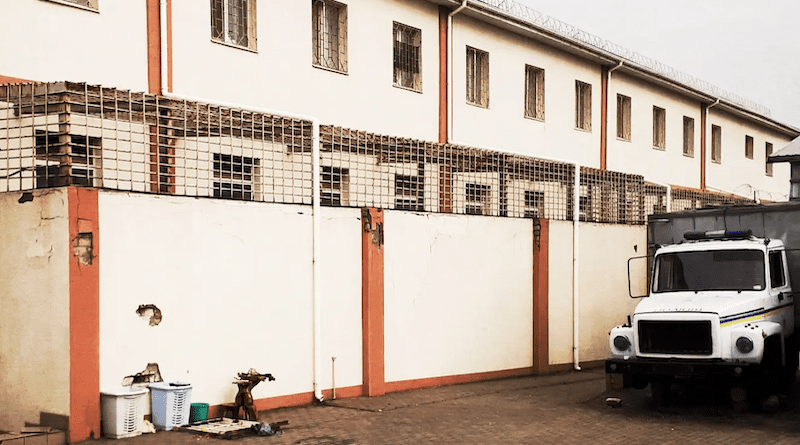Ukraine: Russian Torture Center In Kherson, Says HRW
Russian forces unlawfully detained and tortured residents of the city of Kherson and its vicinity during their occupation of the area between March and November 2022, Human Rights Watch said Thursday.
Victims and their family members told Human Rights Watch about torture and other ill-treatment at a pretrial detention center on Teploenerhetykiv Street in Kherson that local residents referred to as a “hole,” as well as a detention facility on Perekopska Street and makeshift facilities at the municipal administration building, a village school, and an airport hangar. Former detainees consistently reported similar forms of abuse, including severe beatings with sticks and rubber batons, electric shocks, threats of death or mutilation, and use of painful stress positions. No adequate medical care was provided to detainees.
“Russian occupying forces carried out terrifying torture and other abuses against Kherson residents in the torture center on Teploenerhetykiv Street and numerous other detention facilities,” said Yulia Gorbunova, senior Ukraine researcher at Human Rights Watch. “Those responsible for these horrific acts should not go unpunished and the victims and their families need to receive redress for their suffering and information about those still missing.”
Human Rights Watch interviewed 34 people about the abusive treatment of civilians during the Russian occupation of the Khersonska region, from March 2, 2022 until the withdrawal of Russian forces from much of the area on November 11. Twelve former detainees and 10 family members described detainees being tortured or witnessing the torture of other detainees, which in three reported cases resulted in their deaths. These interviews about torture build on dozens of others about torture that Human Rights Watch conducted with Khersonska region residents during earlier months of the occupation, for a July 2022 report.
Russian forces in Kherson appeared to adopt a similar pattern in their treatment of civilians throughout the occupation. They would aggressively search a residence and then detain one or more people living there on a variety of accusations. Several detainees reported that the Russian forces beat and threatened them or their relatives, including older people. Russian soldiers would then cover the eyes or head of those being taken into custody with a hat or bag and force them into a vehicle. They would then be taken to one of the 20 or more detention centers in and around Kherson.
Nearly all of the torture cases documented recently in Kherson involved people held in the pretrial detention center at 3 Teploenerhetykiv Street, 3. One person was also held in makeshift detention facilities at the Kherson International Airport and in the Kherson municipal administration building. Another said that her cellmate had previously been previously held in a pretrial detention center on at 10 Perekopska Street, where the BBC and others reported that Russian occupation forces tortured people. Another former detainee, taken about 120 kilometers from Kherson, said he was held in a 2-by-3 meter storage room of a village school.
Human Rights Watch previously documented cases of torture of detainees, including Ukrainian prisoners of war from the Territorial Defense Forces, at the former National Police Directorate building on 4 Liuteranska Street (formerly Kirova Street).
One former detainee held at Teploenerhetykiv Street said,: “There were five men. … They were all beaten up. There was one who had been shot in the leg; another one had a broken rib. We heard screams [of people being beaten] all day and night. People would be screaming at 3 a.m. and in the evenings. … They didn’t give medical help to anyone.”
Russian guards also humiliated detainees by forcing them to shout pro-Russian slogans, listen to and sing the Russian national anthem and patriotic songs, and applaud the singers, under threat of beatings.
Most relatives interviewed said they were provided no information about the location of their loved ones, which is required by the international law of occupation. Many desperately searched and attempted to deliver packages of food and other essentials without knowing whether they reached the intended recipient.
Detainees and families said that Russian occupying authorities took them and their loved ones into custody for engaging in actual or suspected volunteer activities, providing or expressing support for Ukrainian forces or the government, or for being a veteran of the 2014 Ukrainian security force operations in the Donbas region.
One woman said that Russian forces detained her because they could not locate her husband, and held her hostage until he gave himself up the next day.
When the Ukrainian military retook Kherson in November 2022, Russian forces retreating to the left bank of the Dnipro River took along some detained civilians without fundamental protections, and unlawfully transferred them. These included three men whose family members Human Rights Watch interviewed. Two were released but not allowed to leave still-occupied areas. The Russians also unlawfully transferred and forcibly disappeared a detained activist from Kherson to Simferopol, in Russian-occupied Crimea. Russian authorities have not provided information on her whereabouts and have detained her incommunicado without access to a lawyer.
Ukrainian authorities have been investigating cases of unlawful detention, torture, and other mistreatment in Kherson and the surrounding region during the Russian occupation. Eugen Tereshenko, a prosecutor with the war crimesunit for the Khersonska region, estimates that there were 4,000 to 5,000 registered cases of civilians detained during this period, but the actual number may have been much higher.
It is a war crime to willfully mistreat, torture, or kill civilians or captured combatants in custody, to willfully cause great suffering or serious injury to body or health, or to carry out unlawful deportations or transfers.
“Five months after Russian forces retreated from Kherson and surrounding areas, we’re still only scratching the surface of their atrocities, and the treatment of all Ukrainian civilians in occupied areas is increasingly alarming,” Gorbunova said. “Russian personnel up the chain of command should be on notice that they will be accountable for every crime they commit.”

